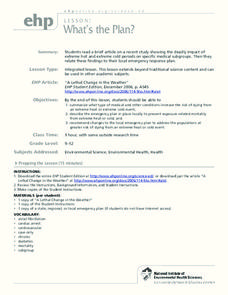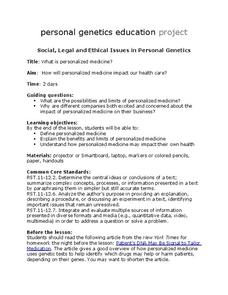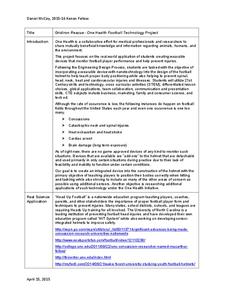Baylor College
Bio Build-up
Trace pollutants through the environment in the seventh lesson of this series on the science of food. Looking at a picture of the plants and animals in an aquatic ecosystem, learners use dot stickers to represent harmful chemicals as...
Baylor College
They're Everywhere: Bacteria
Totally gross out your class with the eighth lesson plan in this series on food science. Explore the microscopic world of bacteria by taking swabs of different classroom objects and growing colonies in petri dishes. An engaging activity...
Baylor College
What's That Food?
Get things cooking with the first lesson plan in this series on the science of food. Working in small groups, young scientists make and record observations about different mystery foods. These descriptions are then shared with the class...
Baylor College
Healthy Snacks
Assess your pupils' ability to identify healthy food choices in the final instructional activity of this series on food science. Given five different food labels, young nutritionists will rank them from most to least healthy, supporting...
Baylor College
Using Food Labels
Help your class make sense of nutrition labels with the ninth lesson of this series. After explaining the different information provided on packaged food labels, perform an activity that demonstrates the amount of sugar in a single can...
Curated OER
In Katrina's Wake
You will need to go to the National Center for Biotechnology Information website to obtain the article, "In Katrina's Wake." Have your class read it and examine maps of where toxic chemicals were located in Louisiana at the time, taking...
Curated OER
What's the Plan?
Is there a higher risk of dying on an intensely hot or incredibly cold day? Explore the effects of extreme weather on human health by reading a short article about a study done to address this question. Since the links in the lesson are...
Curated OER
The Mind-Body Connection
Second graders learn about the human body. For this biology lesson plan, 2nd graders will begin with the basics of understanding charts and graphs and progress into units that cover the body systems, and mental and emotional health....
Curated OER
River of Venom
Read an exciting science mystery about killer bees online, evaluate a list of clues, and try to answer the questions correctly. The story responds to the reader's choices and presents research material for the next step. Though the...
Personal Genetics Education Project
Personalized Medicine
Genetics learners read an article and watch a video about personalized medicine and the hope it holds for treating patients more specifically than doctors currently are able to. They research, design, and produce a brochure about the...
Baylor College
Heart and Lungs
With a partner, youngsters measure their pulse and breathing rates, both at rest and after running in place for a minute. While this activity is not novel, the lesson plan includes a large-scale classroom graphing activity and other...
Baylor College
Heart Rate and Exercise
What is the relationship among the heart, circulation, and exercise? Your class members will explore first-hand how different physical exercises affect an individual's heart rate. They will begin by learning how to measure their own...
Baylor College
Food Webs
Explore various ecosystems from around the world as your class discovers the interdependence of all living things. Using the provided sets of ecosystem cards, young scientists work in small groups building food webs to demonstrate the...
Baylor College
What Is the Water Cycle?
Small groups place sand and ice in a covered box, place the box in the sunlight, then observe as evaporation, condensation, and precipitation occur. These models serve as miniature water cycles and demonstrations of the three phases of...
Baylor College
What Makes Water Special?
Get close up and personal with a drop of water to discover how the polarity of its molecules affect its behavior. Elementary hydrologists split and combine water droplets, and also compare them to drops of oil. Much neater than placing a...
Baylor College
Using Heat from the Sun
Let's heat things up! This simple experiment demonstrates for students the important role the sun plays in providing the earth with energy. Place one cup of water in direct sunlight and one in shade, then take measurements in order to...
Baylor College
Modeling Earth's Atmosphere
Life on Earth is made possible by the unique composition of its atmosphere. Working collaboratively, a scale model is created as young scientists learn about the different layers of gas that surround the planet. Cards are included that...
Baylor College
Can Nutrients in Water Cause Harm?
Ecology candidates culture pond water organisms over a few days time, then they experiment to find out how increasing nutrients affects the population. As part of a unit on water, this exploration gives your class an understanding of how...
Curated OER
Debate: "Indoor Air vs. Outdoor Air Pollution: Which Is the More Serious Threat to Public Health?"
Students work in teams to synthesize their air, asthma, air contamination, and environmental health knowledge as well as additional research to represent a particular point of view persuasively. They create a handout and presentatin...
Baylor College
What's Is Soil Made Of?
It's time to roll up those sleeves and get a little dirty in the second lesson of this series on the science of food. Investigate where plants and animals get the minerals they need to live in this two-part exploration of soil. First,...
Curated OER
The Heart of the Matter
Upper elementary pupils learn about the blood transportation system and anatomy of the human heart. They fill in an outline of the human heart (not included) focusing on the flow of blood to and from the heart. Using stethoscopes, they...
Baylor College
Digestion
Digestion is an amazing and complicated process that provides humans with the energy they need to survive. Lesson six in this series on the science of food uses sliced turkey and a meat tenderizer to demonstrate how enzymes help break...
Curated OER
Food Choices The Pyramid Way
Learners develop skills in making nutritionally-sound food choices. Keeping a food diary, they analyze their food intake using the food pyramid as a guide. Students identify and explain the relationship of nutrition to personal health...
Kenan Fellows
Gridiron Rescue: One Health Football Technology Project
Helmets not included! Scholars brainstorm adjustments and sensors to football helmets in an engineering design project to help prevent injuries, such as concussions and spinal injuries.

























